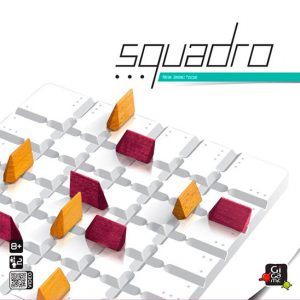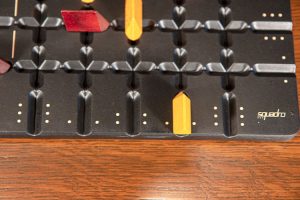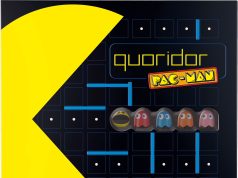 I first heard about publisher Gigamic when I tried out a copy of their abstract strategy game Quarto. I thought that the game was brilliant and it still makes its way to my tabletop when the mood strikes me. Since then, I’ve always made it a point to check out any new abstracts they dig up. And that’s how I got my hands on a copy of their newest offering, Squadro. Much like Quarto, this themeless game has a solid game board and wooden pieces. Can they capture lightning in a bottle twice? Let’s find out.
I first heard about publisher Gigamic when I tried out a copy of their abstract strategy game Quarto. I thought that the game was brilliant and it still makes its way to my tabletop when the mood strikes me. Since then, I’ve always made it a point to check out any new abstracts they dig up. And that’s how I got my hands on a copy of their newest offering, Squadro. Much like Quarto, this themeless game has a solid game board and wooden pieces. Can they capture lightning in a bottle twice? Let’s find out.
Squadro is an abstract strategy board game for 2 players that takes about 15 minutes to play.
Gameplay Overview:
Like all of Gigamic’s offering, learning to play Squadro is simple. The goal is to get 4 of your five pieces to the other side of the board and back. On a player’s turn, they move one of their pieces a number of spaces equal to the amount of dots at the start of its row, usually from 1 to 3 spaces. If a piece would move onto your opponent’s piece, it jumps over it and sends your opponent’s piece back to the start of its row.
Once a piece makes it to the far side of the board, it flips over and prepares for a return trip. The difference here is that its speed value will be reversed. So if it moved 3 spaces on the way out, it will move only 1 space on the way back (and vise versa).
The first player to get four of their pieces back to the start, wins!

Game Experience:
Squadro is an easy game to jump right in and start playing. After only a page or two of rules (the book is also in a variety of languages), we were cogitating on our moves for the game. I always appreciate how accessible Gigamic’s games are, as they seem to make their way to the table with people outside of my usual gaming group.
One interesting thing I found after my first play of Squadro was how the game changes as it progresses. In one game, I jumped out to an early lead and thought I had the game in the bag. Yet one thing I failed to realize is that as you move pieces off the board, you have fewer options to work with. This forced me to start making disadvantageous moves and my opponent quickly caught up. I thought that was a pretty interesting mechanic and I definitely altered my strategy in future games.

However, it also makes me worry that Squadro can be solved, or at least that it lacks that little thing that will help its replay value. In a game like Quarto, not only are there a variety of pieces and shapes, but your opponent chooses the one you use. Squadro is missing that “it” element. Something to help keep the turns and games fresh. This could be because the block movement is very symmetrical. Rows either always move 3/1 spaces, or 2 spaces. After a few games, I felt like I’ve seen all that Squadro has to offer. I wish they had opted for a variable setup to the movement values.
Finally, as is the norm with Gigamic’s titles, Squadro boasts solid production values. The board has a really nice heft to it, and the player pieces are made of a solid wood. While the board is probably too big for a travel game, it does have nice enough aesthetics to be a “coffee table or end table” game you leave out.

Final Thoughts:
While I thought that Squadro was a solid and enjoyable game, my interest in getting it back to the table definitely faded after a few plays. It just didn’t have enough variety to keep the games fresh after you figured out some of the strategy. Other than that though, it was a nice filler game with some solid production values.
Final Score: 3 Stars – A solid, if unexciting abstract strategy game.
 Hits:
Hits:
• Easy to learn
• Good component quality
Misses:
• Plays feel the same from game to game






















